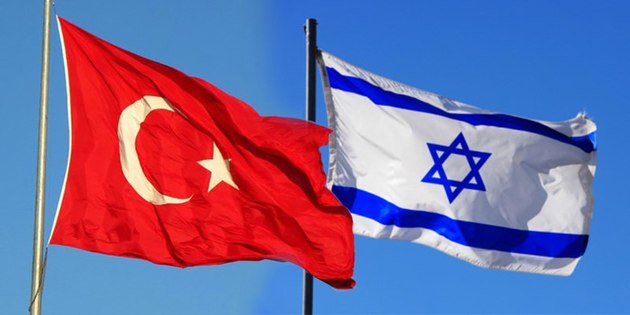Relations between Israel and Turkey could be on the verge of a breakthrough, with a Turkish presidential adviser confirming bilateral talks and that full diplomatic relations could be restored by March. Relations between the once close allies all but collapsed with Turkey withdrawing its ambassador in 2017, amid escalating tensions, Voice of America writes in the article Turkey Poised for Reset in Relations With Israel.
"If Israel comes one step, Turkey maybe can come two steps," the Turkish presidential adviser on foreign affairs, Mesut Casin, said in reference to ongoing talks with Israel. "If we see a green light, Turkey will open the embassy again and return our ambassador. Maybe in March, we can restore full diplomatic relations again. Why not." "Establishing peace and security is very important to Israel and Turkey. After Mavi Marmara, we don't want another accident with Israel," added Casin.
The Mavi Marmara was the largest of six vessels in a Gaza-bound flotilla carrying humanitarian aid for Palestinians back in 2010. Pro-Palestinian activists seeking to break Israel's economic blockade of the Gaza Strip were on board when Israeli forces stormed the vessel, killing nine Turkish nationals. Since then, Turkish-Israeli relations have never fully recovered despite intense mediating efforts by the United States to rebuild ties between its two key regional allies.
U.S. President Donald Trump's decision to recognize Jerusalem as the Israeli capital and Israeli security forces' crackdown on Palestinian protests saw Turkey and Israel withdrawing their ambassadors. Casin acknowledged the election of Joe Biden to the U.S. presidency as a boost to efforts to repair ties. “There are new perspectives with Biden; a lot of things will change," he said.
Turkish President Recep Tayyip Erdogan enjoyed a close relationship with Trump, but a Biden presidency is predicted to be more challenging for Ankara. "Turkish-American relations are expected to enter a tough period, at least in the short run, considering the Biden administration's sensitivity toward issues of democracy and human rights," said Selin Nasi, an analyst on Turkish-Israeli affairs. "Given the anti-Turkish opinion prevalent in the U.S. Congress, Turkey might be hoping that Israel can neutralize the opposition and help Turkey win Washington's ear again," she added.
Turkey and Israel did find recent common ground in the recent conflict between Armenia and Azerbaijan over Nagorno-Karabakh, the disputed mainly ethnic Armenian enclave in Azerbaijan. Israeli and Turkish drones and reported intelligence support from the two countries proved pivotal in Azerbaijan's victory over Armenian forces backed by Iran. "It is harder to read Israel's motivation [in improving ties with Turkey], Nasi told VOA. "Though, it is true that Turkey and Israel have convergent interests in the Middle East, particularly in terms of rolling back Iran's power and influence." "At a time when Israel is normalizing her relations with several Muslim countries, adding Turkey to the list will improve her conciliatory image in the international arena," she added.
Much to gain for Turkey
Turkish presidential adviser Casin argues Israel has a lot to gain from normalization. "Turkey bought a lot of weapons from Israel. We can arrange this again," he said, "Turkey's and Israel's defense industries can go ahead together." "Secondly, energy resources, They [Israel] discover oil and gas. OK, Israel is 8 million people. Where can they sell this oil and gas? The biggest market is Turkey, and Turkey will be via a pipeline, the corridor to the European Union market."
A significant repercussion from Israeli and Turkish tensions is Israel allying itself with Turkey’s regional rivals, Egypt and Greece. The three countries are developing cooperation based on energy and defense, a move that observers say is a reaction to Turkey's increasingly robust stance in the region.
Turkey ready to make concessions
International relations professor Huseyin Bagci of Ankara's Middle East Technical University suggests Ankara is ready to make concessions. "Ankara will lessen their support," Bagci said. "Turkey has promised not to support so openly the Muslim Brotherhood. When Ibrahim Kalin [Erdogan's spokesman] visited Brussels, he probably made promises on similar lines. This is why there is a higher expectation Turkey is making reforms, not to support the Muslim Brotherhood."
But ultimately, any improvement in ties will need to overcome the animosity between Erdogan and Israeli Prime Minister Benjamin Netanyahu, "There is the bad blood between the two leaders, Erdogan and Netanyahu," said Bagci. Both leaders routinely exchange insults, which observers say plays well with their electoral bases. With Israel likely set for new elections, analysts say it is unlikely there will be an announcement of any breakthrough before the expected poll outcome.






